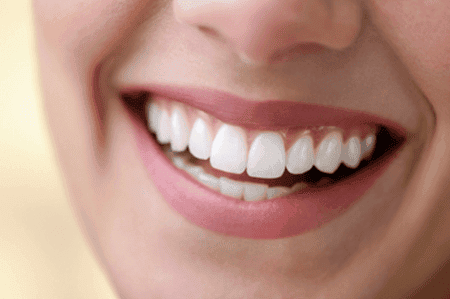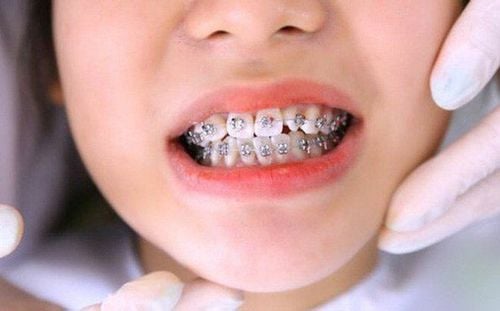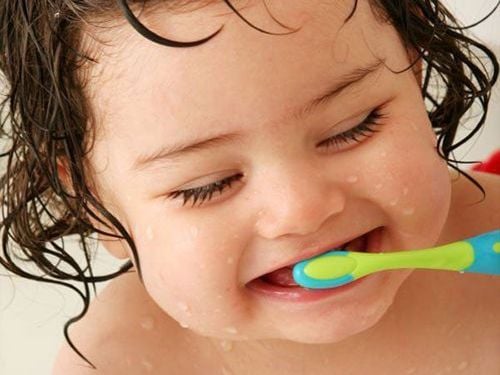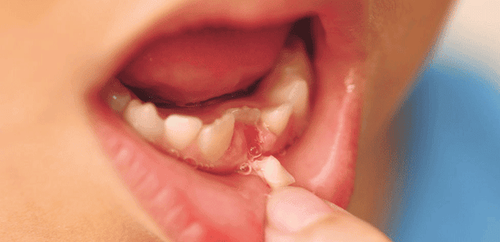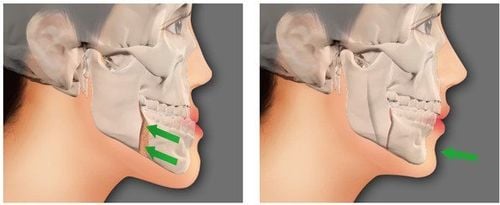This is an automatically translated article.
Baby teeth have a very important role in the first years of a child's life. Teeth support the process of chewing and grinding food, making food easier to digest, facilitating the growth of the jawbone. In addition, baby teeth help children pronounce more clearly. So questions like "What's wrong with misaligned baby teeth?" and "what to do when baby teeth grow out of place?" Many parents are interested.1. What causes milk teeth to be misaligned?
Crooked, misaligned teeth are very common. They can appear in both the baby teeth of children and the permanent teeth of adults. However, deviated milk teeth in children are the most common. Experts also recommend that we do not straighten our teeth when it is crooked or crooked.
Some habits such as improper sucking of pacifiers or thumb sucking in children can also cause baby teeth to erupt.
A baby's baby teeth are misaligned does not mean that the permanent teeth are misaligned. However, if the baby teeth are crowded together, the permanent teeth can also be crowded. Or if the child has an injury in the mouth or has dental problems that are not handled in time such as tooth decay, gingivitis, ... causing baby teeth to fall out earlier than usual, then it is very likely that the permanent teeth It can then grow out of the gum line.
In addition, other problems affecting baby teeth that can also affect permanent teeth include:
Misalignment (misaligned jaw): Each person's upper teeth tend to fit slightly compared to the molars lower, with the points of the upper teeth fitting snugly into the grooves of the lower teeth. When this alignment does not occur, the result is crooked and misaligned teeth. Common deviations include overbite and underbite. Genetics and genes: If one or both of a child's parents have crowded or crooked teeth, there's a good chance their child will also have the condition. Children can also inherit squishy or underbite traits from their parents. Poor oral care: Children who are not properly cleaned by their parents can lead to dental problems such as: Gum disease, tooth decay. If these problems are not treated promptly, they can lead to crooked teeth and other oral health problems. Poor nutrition: Poor nutrition, especially in children, can lead to tooth decay and poor oral development, which is a potential precursor to crooked teeth. Facial trauma: A blow to the face or mouth can fracture a tooth, resulting in one or more crooked teeth.
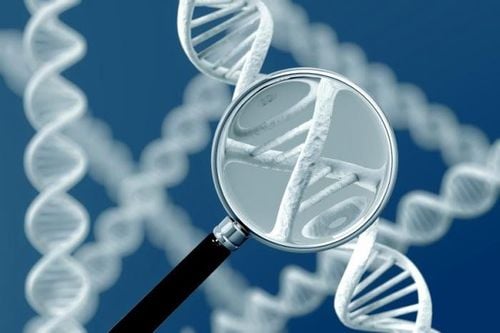
Di truyền và gen là một trong các vấn đề ảnh hưởng đến răng sữa mọc lệch
2. Consequences of misaligned baby teeth
In some cases, crooked or misaligned baby teeth can affect a child's quality of life. Other health problems that crooked teeth can cause include:
Periodontal disease: It can be difficult to clean between crooked teeth. This can lead to tooth decay and gum disease. If left untreated, gum disease can lead to periodontitis, a more serious infection that can damage bones and teeth. Chewing and Digestion: Crooked teeth can also interfere with proper chewing and cause digestive problems. Excessive wear: Crooked teeth can also cause excessive wear and tear on the teeth, gums, and jaw muscles and lead to cracked teeth, jaw strain, temporomandibular joint disorders, and chronic headaches. Speech difficulties: If your teeth are misaligned, they can affect the way you make sounds, causing speech problems. Confidence: Dissatisfaction with your appearance can lead to a lack of confidence and a tendency to avoid social activities.
3. Misaligned baby teeth, what to do?
Parents are not too worried when their baby's baby teeth are misaligned, but that doesn't mean they don't care about their child's oral health.
To prevent misalignment of baby teeth, parents should practice brushing their children's teeth properly; Hit at least 2 times a day, in the morning when you wake up and in the evening before you go to bed. In the evening, parents should not let children drink and eat sweets such as candy, carbonated soft drinks. Enhancing children with foods rich in vitamins, protein, calcium, especially vitamin D, milk helps children's teeth to be stronger. Children should have regular dental check-ups, at least every 6 months. In the case of children whose milk teeth are loose, early loose, or decayed; Parents should choose reputable dental clinics to visit and be consulted by a dentist to avoid the long-term case of damaged baby teeth, and later eruption. The Department of Odonto-Stomatology at Vinmec International General Hospital is proud of being a prestigious and quality medical system chain. Owning a system of leading modern dental equipment in the country; gathers a team of good doctors in the field of dentistry, dedicated and thoughtful in examining and treating thousands of cases of periodontitis successfully; All dental services are performed according to strict infection control standards, ensuring maximum safety and hygiene to bring satisfaction to all customers.
Especially for young children, the medical team will have a separate regimen to help children no longer be afraid to create the most comfort for the child, but still ensure their health and aesthetics later.
Please dial HOTLINE for more information or register for an appointment HERE. Download MyVinmec app to make appointments faster and to manage your bookings easily.




